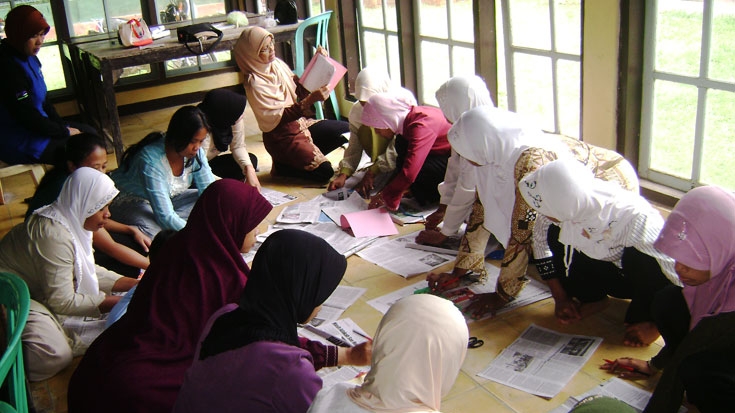Overview
The Female-Headed Household Empowerment Program (PEKKA), which began in 2001, is operating in 19 provinces in Indonesia and has 750 groups in 475 villages as of March 31, 2012. PEKKA has benefitted around 20,000 women and approximately 52,000 of their family members by improving their livelihood and well-being.
Challenge
The origins of the PEKKA program are from two different sources. First, as early as 1999, the Ministries of National Development Planning (Bappenas) and Home Affairs (Kemendagri) asked the World Bank to design targeted programs for vulnerable widows. The National Statistics Board was showing high poverty rates among female-headed households, and further poverty assessments also showed that the incidence of poverty among widows accounted for a significant share of the rural very poor, particularly in the conflict provinces. Second, information from quantitative and field reviews of World Bank-financed national community development projects showed that vulnerable widows were not joining collective decision-making and were especially vulnerable to second-generation poverty coming from their catastrophic loss. Female single household heads generally occupy a marginal position in all aspects of life and are denied opportunities. Prior to PEKKA, no development project in Indonesia had ever worked with widows, especially in areas of large-scale conflict.
Approach
PEKKA started with a vision of female heads of households contributing to building a prosperous, gender-equal and dignified society. PEKKA’s mission is to:
- improve the livelihood and well-being of PEKKA women,
- facilitate better access to available resources,
- build critical awareness on the equality of their role, responsibilities and social status, as well as their socio-political rights,
- enhance PEKKA women’s participation in various aspects of social, economic, political and cultural lives, and
- increase PEKKA women’s control over the decision-making process from family to national level.
PEKKA implemented a four-pillar strategy consisting of:
- Visioning—developing a critical awareness on women’s rights, increase their motivation, and facilitate the women’s building of a vision and mission to be in control of their own lives.
- Capacity building—participative training and workshops in technical and managerial skills to increase self-confidence.
- Organization and network development—establishing and strengthening community-based groups (PEKKA groups).
- Advocacy and Social Change—access to information, resources, decision-making, and legal justice, as well as educating the public about the role of PEKKA.
Results
- There are 750 PEKKA groups in 475 villages of 19 provinces. All PEKKA members are poor women and programs benefit family members and other community members.
- Thirty-three cooperative microcredit schemes are owned and managed by PEKKA groups with total assets of US$1,280,000 and savings mobilized of US$340,000. Loans range from US$100 to US$2,800.
- After the Aceh tsunami, PEKKA built and renovated 284 houses, supported 830 PEKKA members to reestablish lost businesses and provided scholarships to 2,489 poor children.
- Trained more than 1,500 grassroots women leaders actively engaged in various processes in community decision-making and development planning.
- Trained more than 100 PEKKA paralegals that assisted 6,639 poor children in getting birth certificates, 2,317 members in accessing village court for marriage cases, and 14 women in presenting cases of violence to court.
- Established 61 early childhood education centers, which provided assistance to 2,343 poor students, and 92 literacy centers, which taught 2,562 illiterate poor women participants, and provided scholarships to 233 dropout women leaders to finish their formal elementary, junior high and high school certificate through a government equivalency program.
- Provided 15,450 scholarships to schoolchildren (9 years compulsory).
- Established 88 community-based learning centers, accessed annually by more than 7,000 community members, of which 10 percent are male.
- Established nine community radio stations with an average on-air duration of 8.5 hours daily, reaching 7,700 listeners, and seven community video studios that produce annually on average 10 community videos on social issues and justice. All facilities are managed by PEKKA members.

